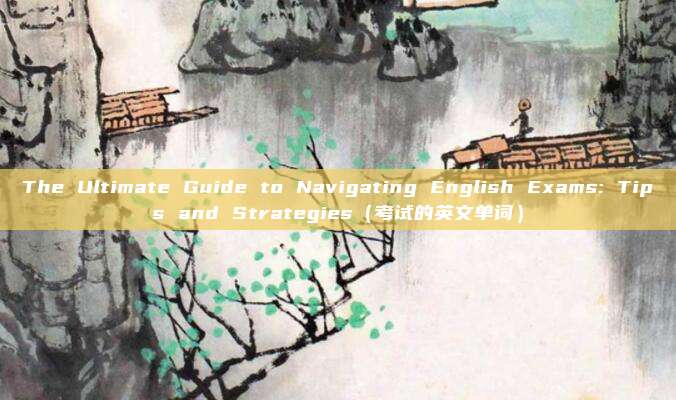The Ultimate Guide to Navigating English Exams: Tips and Strategies(考试的英文单词)
温馨提示:这篇文章已超过199天没有更新,请注意相关的内容是否还可用!
Introduction
In the globalized world we live in today, proficiency in English is no longer a luxury but a necessity. Whether you are a student aiming for higher education, a professional seeking international opportunities, or simply someone passionate about the English language, navigating English exams is a crucial step towards achieving your goals. This article serves as a comprehensive guide to help you understand the different types of English exams, the skills they assess, and the strategies you can employ to excel in them.
Understanding the Types of English Exams
Firstly, it's essential to be aware of the various English exams that exist. Some of the most widely recognized ones include:

IELTS (International English Language Testing System): Ideal for those seeking to migrate to an English-speaking country or pursue higher education abroad.
TOEFL (Test of English as a Foreign Language): Popular among international students and professionals in the United States.
Cambridge English Qualifications: A suite of exams that cater to different levels of English proficiency, from A1 (beginner) to C2 (master).
Each exam has its unique format and focus, but they generally assess four key language skills: reading, writing, listening, and speaking.
Developing Essential Skills
To excel in English exams, you need to develop a strong foundation in these four skills:
Reading: Practice reading a variety of texts, including articles, novels, and academic papers. This will help you improve your comprehension and vocabulary.
Writing: Regularly write essays and reports. Pay attention to grammar, structure, and coherence. You can use resources like the Cambridge IELTS series or the TOEFL Writing practice tests.
Listening: Listen to English podcasts, watch English movies or TV shows, and engage in conversations with native speakers. This will enhance your listening comprehension and familiarize you with different accents and colloquialisms.
Speaking: Practice speaking by participating in language exchange programs, joining a conversation club, or even recording yourself and analyzing your pronunciation and fluency.
Effective Study Strategies
Here are some practical strategies to help you prepare for English exams:
Set Realistic Goals: Break down your preparation into manageable goals and timelines. Use a study planner to keep track of your progress.
Use Authentic Materials: Utilize authentic materials such as newspapers, magazines, and academic journals to prepare for reading and writing sections.
Engage in Practice Tests: Regularly take practice tests to familiarize yourself with the exam format and to identify areas that need improvement.
Seek Feedback: If possible, have a tutor or teacher review your written and spoken English to provide constructive feedback.
Stay Consistent: Consistency is key in language learning. Dedicate time to practice every day, even if it's just for a short period.
The Importance of Practice and Patience
It's important to understand that language learning is a gradual process. While some may see immediate results, others may take longer to develop their skills. Be patient with yourself and keep practicing regularly. Remember, success in English exams is not just about the final score but also about the skills and knowledge you gain along the way.
Conclusion
Navigating English exams can be a challenging but rewarding experience. By understanding the types of exams, developing essential skills, employing effective study strategies, and maintaining consistency, you can significantly improve your chances of success. Whether you are preparing for IELTS, TOEFL, or any other English proficiency test, this guide is designed to equip you with the knowledge and tools you need to achieve your goals. Start your journey today and witness the transformative power of language learning!
网站文章、图片来源于网络,以不营利的目的分享经验知识,版权归原作者所有。如有侵权请联系删除!





还没有评论,来说两句吧...